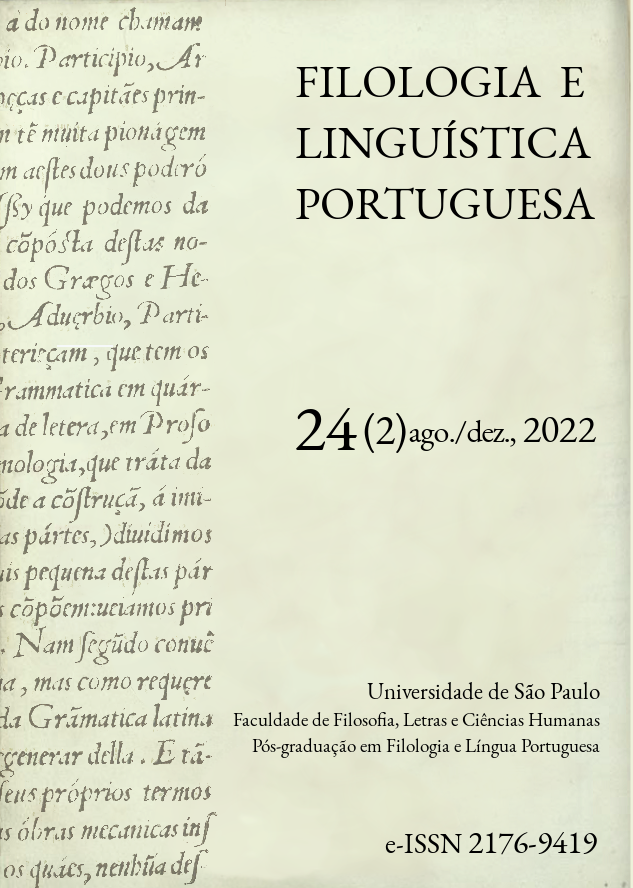The concept of meaning -blindness in Wittgenstein: how to experience meanings?
DOI:
https://doi.org/10.11606/issn.2176-9419.v24i2p125-145Keywords:
Cegueira de significado, Filosofia da psicologia, Gramática, Intersubjectividade, WittgensteinAbstract
In 1946-47 Wittgenstein taught his last lecture course at Cambridge before his retirement. These lectures were on the philosophy of psychology in general and specifically on experience, language, meaning and understanding. This article discusses the application and meaning of the concept of “meaning-blindness” by Wittgenstein in the context of his work and around these topics. This article presents a theoretical-conceptual approach based on Wittgenstein’s linguistic psychology and philosophy of grammar, assuming the thesis that linguistic production and culture affect the common use of language. In this perspective, the difficulties revealed by an intersubjective semantics are discussed, with the aim of revealing the semantic aporias manifested by the experience of a “meaning-blindness”.
Downloads
References
Anscombe GEM. From Parmenides to Wittgenstein. Oxford: Blackwell; 1981.
Budd M. Wittgenstein’s philosophy of psychology. Routledge: London; 1991.
Deleuze GGF. O que é a filosofia? Lisboa: Presença; 1992.
Ducrot O, Todorov T. Diccionario enciclopédico de las ciencias del lenguaje. Buenos Aires: Siglo Veintiuno Editores; 2011.
Eco U. O signo. Lisboa: Editorial Presença; 2004.
Fiske J. Introdução ao estudo da comunicação. Lisboa: Asa; 1993.
Geach PT, Shah KJ, Jackson AC. Wittgenstein’s lectures on philosophical psychology 1946-47. London: Harvester-Wheatsheaf; 1988.
Glock HJ. A Wittgenstein dictionary. Oxford: Basil Blackwell; 1996.
Goodman RB. Wittgenstein and William James. Cambridge: Cambridge University Press; 2002.
Hark M. Beyond the inner and the outer - Wittgenstein’s philosophy of psychology. Kluwer Academic Publishers; 1990.
James W. Principles of psychology. Bristol: Thoemmes Press; 1998.
Morris C. Foundations of the theory of signs, in Writings on the general theory of signs. The Hague, Gruyter Mouton; 1971.
Peirce CS. Collected papers. Cambridge, Massachusetts: Harvard University Press; 1978.
Ricoeur P. Le symbole donne à penser. Esprit. 1959;27(7-8):60-76.
Ricoeur P. O discurso da acção. Lisboa: Edições 70; 2013.
Saint-Exupéry A. The little prince. Thorndike, Me.: GX Hall & Co; 1995.
Santo Agostinho. De dialectica. E. Munteanu, tradutor. Bucaresti: Humanitas; 1991.
Schmaltz D. The blind men and the elephant. San Francisco: Berrett-Koehler Publishers; 2003.
Schulte J. Experience & expression: Wittgenstein’s philosophy of psychology. Oxford: Clarendon Press; 2003.
Wittgenstein L. Lectures and conversations on aesthetics, psychology and religious belief. Berkeley: University of California Press; 1967.
Wittgenstein L. Remarks on colour. Oxford: Basil Blackwell; 1980.
Wittgenstein L. On certainty. Oxford: Basil Blackwell; 1993a.
Wittgenstein L. Philosophical grammar. Oxford: Basil Blackwell; 1993b.
Wittgenstein L. Zettel. Oxford: Basil Blackwell; 1993c.
Wittgenstein L. Last writings on the philosophy of psychology II. Oxford: Basil Blackwell; 1994.
Wittgenstein L. Philosophical investigations. Oxford: Basil Blackwell; 1996.
Wittgenstein L. Remarks on the philosophy of psychology I. Oxford: Basil Blackwell; 1998a.
Wittgenstein L. The blue and brown books. Oxford: Basil Blackwell; 1998b.
Wittgenstein L. Remarks on the philosophy of psychology II. Oxford: Basil Blackwell; 1998c.
Wittgenstein L. Last writings on the philosophy of psychology I. Oxford: Basil Blackwell; 1998d.
Wittgenstein L. Tractatus logico-philosophicus. London: Routledge; 1999.
Downloads
Published
Issue
Section
License
Copyright (c) 2022 Paulo Barroso

This work is licensed under a Creative Commons Attribution-NonCommercial 4.0 International License.
Copyright is transferred to the journal for the online publication, with free access, and for the printing in paper documents. Copyright may be preserved for authors who wish to republish their work in collections.



















